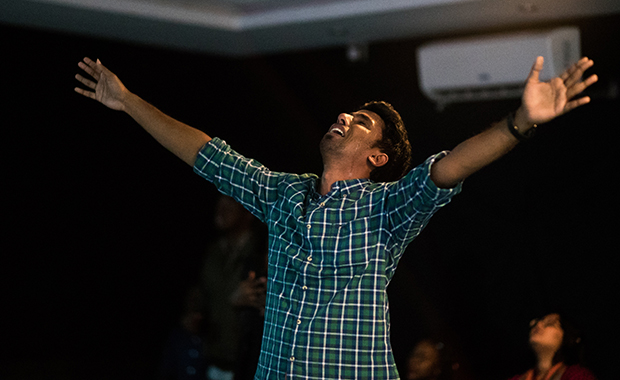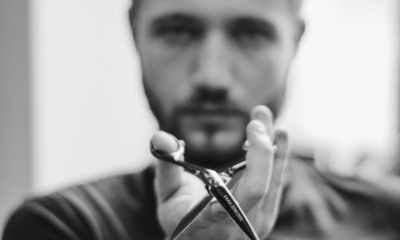Life
How A Heart Attack Can Make You See Someone Differently

Ten days ago I was getting ready to go overseas and I got a call that nobody ever wants to receive. It was a call from a work colleague to tell me that the person I sit next to every day at work had suffered a massive heart attack.
The person that gave me the news was also one of two people that helped to revive our friend when he started to turn blue. If that wasn’t enough, this same person that helped revive our friend had also lost his mum a few months before in a similar scenario where he was present and saw it all happen.
With our friend in a critical state, I felt bad that I had to get on a plane in a few hours. I realised there was nothing I could do other than hope, but I still felt uneasy.
This unfortunate situation made me see our friend in a new way and look at life differently in these five ways:
1. You think about life without them
Instantly after I got the news of our friend’s ordeal, I started to think about life without them. Our friend was working on a project that has the capacity to change the face of the Australian business world.
He had years of expertise in his field that allowed him to see a vision for business that not everyone else could see the way he did. He put all of his passion into this project and went out of his way to bring in the younger generations to share the knowledge.
He always believed that his network was important and to treat people with the highest level of respect. It was this way of doing business that made me respect this man. Guys like him just didn’t exist in the usual business community and I wondered what would happen if he was not able to fulfil his vision.
I wondered if the person that would replace him would do the same job, with the same passion as him. When we see someone we care about go through a horrific situation like this our human brain defaults to a feeling of sadness and potential loss.
No matter how much personal development we do, this default mindset is very hard to avoid. What I found through this experience was that I had to become consciously aware of this default response to our friend’s situation. I was forced to see good in what had happened even though from the outside it may seem like there was no reason too.
I told myself that if he lived, he would be better than he ever was before and he would have a new way at looking at his health. I also told myself that if he didn’t live, that he had lived a good life and given everything he could to his work and family.
I told myself that if he were to leave this world, that someone else whom he had taught would take over his role, and use the same attributes he had shown to fulfil the original vision.
See how the power of reframing the situation can completely change what something means to you?
2. You forget how someone is
When you work next to someone each day, it’s very easy not to be truly grateful for who they are. In the case of this story, it was only when our friend was no longer sitting next to me each day that I remembered how he acted.
We often don’t get time to fully assess someone and their impact until we are put in situations where we think we may not see them again. It’s not like we do an annual review of every person we know and rate what we like about them, and think back on what they have achieved (although this gratitude exercise is something we all should do).
Not seeing our friend each day made me see the void that was left without them. The office was a lot quieter, there were fewer visitors coming in to see us who had be drawn in by our friend, and we suddenly had a knowledge gap in our team that we never were conscious of before.
What is it that makes us forget how someone is? The answer, it’s the thousands of thoughts buzzing around our head all the time that numb us from being truly grateful for the people we have in our life. It’s these thousands of mind numbing thoughts that are holding us back from success.
3. You forget that there is a family involved
After our friend had a heart attack, I found that a lot of us defaulted to thinking about what this person meant to us, and the things that would impact us individually in the future. While the sadness affected me, I saw pretty quickly that I was completely forgetting about the people that were being affected the most – his family.
See that’s the challenge, we can be very quick to look at a situation based on the effect it has on us and not think about the people who are being affected even more than ourselves. I started to think about his friends, children and his very young grandchildren.
Sure the situation was tough for me but when I started to think about what it would be like for his close family, my pain very quickly began to dissipate.
It’s when we stop looking at our own life and start thinking about other people that we truly start to heal our pain and become a leader that everyone looks up to.
4. You think you could have prevented the situation
Another life lesson that I got out of all of this was yet another default way of thinking that we all have; we think that we could have somehow, magically, prevented the situation. For me, I started thinking to myself maybe I should have pushed him more not to drink Coke or maybe I could have used what I do on Addicted2Success to help those affected instead of going overseas.
These thoughts are a natural reaction and when I really thought about it carefully, I realised that I can’t be responsible for everyone else choices. If someone wants to consume something that is very bad for them, it’s not a good idea for me to try and force my beliefs or opinions on them.
I thought to myself, “Tim not everyone is trying to live to 150 years old and maybe they want to enjoy life and have a soft drink when they like.”
This change of perspective helped me a lot in thinking of our friend in a different light. In terms of not being present for the whole event, again, I realised that tragedy is going to happen in the world all the time and I can’t be everywhere at once.
In these difficult situations, the best thing you can do is let the people who are there step up and take care of everything (which is what happened in this story).
The last thing I thought I could have done to prevent or help the situation was to use the tools I use on Addicted2Success to help. Now, while I thought I couldn’t do this, as it turns out I did. When I returned from overseas, we wrote a card to our friend, and I left a heartfelt, inspiring message in there.
I then wrote this article to help the situation further as well as talking with the people that were involved and using some of the personal development tools I have in my toolbox. So we can’t prevent every situation, but we can always help, and it doesn’t have to be right away as these situations can have an effect for months and sometimes years.
5. You reflect on your own life
As I spoke with people about what had occurred when I returned from overseas, I had an unexpected thing happen; I began to reflect on my own life. Explaining how all of this had affected me made me reflect on what I was about to go through.
In a video I posted on Addicted2Success last week, I spoke about how I am about to go to hospital and what might happen. What became apparent is that I’m using what happened to my friend and the lessons I learnt, to help me with my own battle in hospital next week. Everything I was saying to others about my friend’s heart attack, I was also saying right back to myself.
Maybe all of this madness was in some way meant to happen so that it could help me with my own struggles. Maybe that was the empowering reason for it all and I was just a participant in this life lesson that spanned across multiple people.
Have you had a situation like this occur? What was the empowering life lesson you got from it? Let me know in the comments section below or on my Twitter and Facebook Pages
Did You Know
How Skilled Migrants Are Building Successful Careers After Moving Countries
Behind every successful skilled migrant career is a mix of resilience, strategy, and navigating systems built for locals.

Moving to a new country for work is exciting, but it can also be unnerving. Skilled migrants leave behind familiar systems, networks, and support to pursue better job opportunities and a better future for their families. (more…)
Life
10 Research-Backed Steps to Create Real Change This New Year
This New Year could finally be the one where you break old patterns and create real, lasting change.

Every New Year, we make plans and set goals, but often repeat old patterns. (more…)
Life
9 Harsh Truths Every Young Man Must Face to Succeed in the Modern World
Before chasing success, every young man needs to face these 9 brutal realities shaping masculinity in the modern world.

Many young men today quietly battle depression, loneliness, and a sense of confusion about who they’re meant to be.
Some blame the lack of deep friendships or romantic relationships. Others feel lost in a digital world that often labels traditional masculinity as “toxic.”
But the truth is this: becoming a man in the modern age takes more than just surviving. It takes resilience, direction, and a willingness to grow even when no one’s watching.
Success doesn’t arrive by accident or luck. It’s built on discipline, sacrifice, and consistency.
Here are 9 harsh truths every young man should know if he wants to thrive, not just survive, in the digital age.
1. Never Use Your Illness as an Excuse
As Dr. Jordan B. Peterson often says, successful people don’t complain; they act.
Your illness, hardship, or struggle shouldn’t define your limits; it should define your motivation. Rest when you must, but always get back up and keep building your dreams. Motivation doesn’t appear magically. It comes after you take action.
Here are five key lessons I’ve learned from Dr. Peterson:
-
Learn to write clearly; clarity of thought makes you dangerous.
-
Read quality literature in your free time.
-
Nurture a strong relationship with your family.
-
Share your ideas publicly; your voice matters.
-
Become a “monster”, powerful, but disciplined enough to control it.
The best leaders and thinkers are grounded. They welcome criticism, adapt quickly, and keep moving forward no matter what.
2. You Can’t Please Everyone And That’s Okay
You don’t need a crowd of people to feel fulfilled. You need a few friends who genuinely accept you for who you are.
If your circle doesn’t bring out your best, it’s okay to walk away. Solitude can be a powerful teacher. It gives you space to understand what you truly want from life. Remember, successful men aren’t people-pleasers; they’re purpose-driven.
3. You Can Control the Process, Not the Outcome
Especially in creative work, writing, business, or content creation, you control effort, not results.
You might publish two articles a day, but you can’t dictate which one will go viral. Focus on mastery, not metrics. Many great writers toiled for years in obscurity before anyone noticed them. Rejection, criticism, and indifference are all part of the path.
The best creators focus on storytelling, not applause.
4. Rejection Is Never Personal
Rejection doesn’t mean you’re unworthy. It simply means your offer, idea, or timing didn’t align.
Every successful person has faced rejection repeatedly. What separates them is persistence and perspective. They see rejection as feedback, not failure. The faster you learn that truth, the faster you’ll grow.
5. Women Value Comfort and Security
Understanding women requires maturity and empathy.
Through books, lectures, and personal growth, I’ve learned that most women desire a man who is grounded, intelligent, confident, emotionally stable, and consistent. Some want humor, others intellect, but nearly all want to feel safe and supported.
Instead of chasing attention, work on self-improvement. Build competence and confidence, and the rest will follow naturally.
6. There’s No Such Thing as Failure, Only Lessons
A powerful lesson from Neuro-Linguistic Programming: failure only exists when you stop trying.
Every mistake brings data. Every setback builds wisdom. The most successful men aren’t fearless. They’ve simply learned to act despite fear.
Be proud of your scars. They’re proof you were brave enough to try.
7. Public Speaking Is an Art Form
Public speaking is one of the most valuable and underrated skills a man can master.
It’s not about perfection; it’s about connection. The best speakers tell stories, inspire confidence, and make people feel seen. They research deeply, speak honestly, and practice relentlessly.
If you can speak well, you can lead, sell, teach, and inspire. Start small, practice at work, in class, or even in front of a mirror, and watch your confidence skyrocket.
8. Teaching Is Leadership in Disguise
Great teachers are not just knowledgeable. They’re brave, compassionate, and disciplined.
Teaching forces you to articulate what you know, and in doing so, you master it at a deeper level. Whether you’re mentoring a peer, leading a team, or sharing insights online, teaching refines your purpose.
Lifelong learners become lifelong leaders.
9. Study Human Nature to Achieve Your Dreams
One of the toughest lessons to accept: most people are self-interested.
That’s not cynicism, it’s human nature. Understanding this helps you navigate relationships, business, and communication more effectively.
Everyone has a darker side, but successful people learn to channel theirs productively into discipline, creativity, and drive.
Psychology isn’t just theory; it’s a toolkit. Learn how people think, act, and decide, and you’ll know how to lead them, influence them, and even understand yourself better.
Final Thoughts
The digital age offers endless opportunities, but only to those who are willing to take responsibility, confront discomfort, and keep improving.
Becoming a man today means embracing the hard truths most avoid.
Because at the end of the day, success isn’t about luck. It’s about who you become when life tests you the most.
Change Your Mindset
The Four Types of Happiness: Which One Are You Living In?
Most people chase success only to find emptiness, this model reveals why true happiness lies somewhere else.

In a world driven by rapid technological growth and constant competition, many people unknowingly trade joy for achievement. (more…)
-

 News2 weeks ago
News2 weeks agoBrandon Willington Builds 7-Figure Business by Ignoring Almost Everything
-

 Health & Fitness3 weeks ago
Health & Fitness3 weeks agoWhat Minimalism Actually Means for Your Wellness Choices
-

 Did You Know3 weeks ago
Did You Know3 weeks agoWhy Most Online Courses Fail and How to Fix Them
-

 Business3 weeks ago
Business3 weeks agoIf Your Business Internet Keeps Letting You Down, Read This
-

 Business1 week ago
Business1 week agoEntrepreneur’s Guide to Pay Stubs: Why Freelancers and Small Business Owners Need a Smart Generator
-

 Business5 days ago
Business5 days agoThe Salary Shift Giving UK Employers An Unexpected Edge
-

 Business7 days ago
Business7 days agoThe Simple Security Stack Every Online Business Needs
-

 Scale Your Business6 days ago
Scale Your Business6 days ago5 Real Ways to Grow Your User Base Fast






















